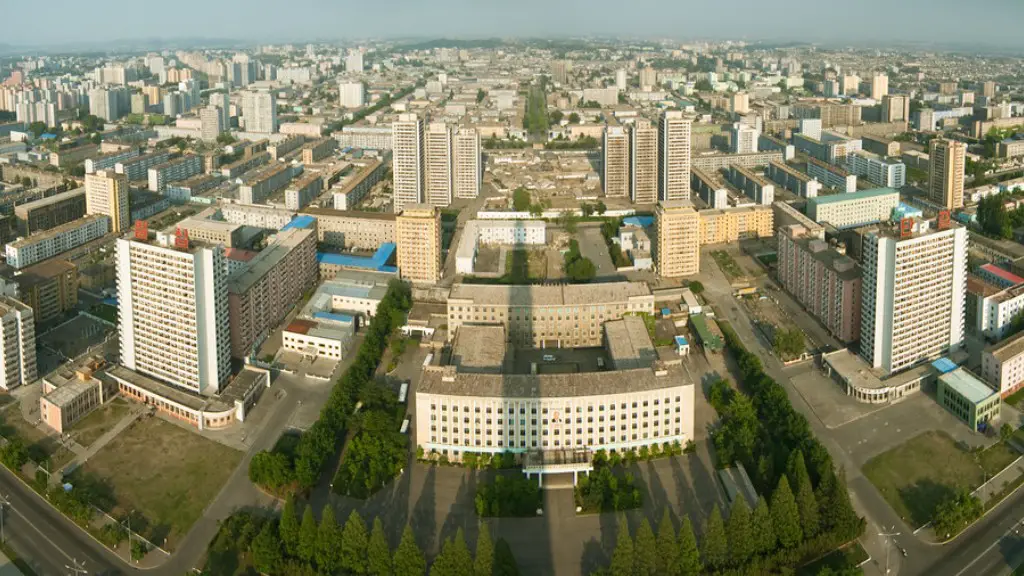Victim And Bystander: North Korea And China In A Strange Alliance
One of the most enduring and mysterious alliances of the modern era is the alliance between North Korea and China. Both countries have remained steadfast in their commitment to each other since the Korean War in the 1950s. But why? What is driving this strange relationship between two countries that appear to have very little in common?
One way of understanding the relationship between North Korea and China is to see it as a “victim and bystander” dynamic. North Korea, the victim in this scenario, is struggling to survive against a hostile western world, in the form of sanctions and embargoes, and is in need of allies to support it. North Korea’s wise decision to become close with China, the bystander, has allowed it to survive, gain militarily, and even gain diplomatic legitimacy in international circles.
At the same time, China has its own interests in nourishing the relationship. From an economic perspective, North Korea has provided China with a low-cost source of labor, minerals, and resources. This has been a vast bonus for the Chinese economy and is one of the driving forces behind its rapid development over the past few decades.
On the geopolitical side, China has also used its alliance with North Korea to help further its own rise in the international context. By standing behind North Korea and providing it with protection and resources, China has been able to increase its influence in the region and ensure a buffer zone against the United States and its allies.
Finally, it is also important to consider that there is a shared ideology between the two countries. Both North Korea and China are authoritarian states and share a belief in the importance of maintaining strict social discipline and loyalty to the ruling leadership. This common ideology further strengthens their bond, making it more of an alliance than a simple relationship of convenience.
A Fateful Friendship
It is clear that the North Korea-China alliance has an incredibly long history. And, while there may have been tension and disagreements between the two countries in the past, the two remain close allies to this day. This enduring friendship is rooted in a mutual interest in maintaining the status quo in East Asia.
At the same time, however, it is possible to argue that the two countries have a symbiotic relationship that benefits each of them in unique ways. As previously mentioned, China has been able to gain access to cheap resources and gain geopolitical influence by standing behind North Korea. On the other hand, North Korea has been able to survive and even gain diplomatic legitimacy in some ways due to its alliance with China.
Finally, it is important to consider the cultural and ideological ties that continue to bind the two countries together. North Korea and China share an authoritarian political culture and a belief in a strong centralized government, which makes it easier for them to trust each other and work together.
From Friendship To Family
Amazingly, the North Korea-China alliance has grown from simply being just two countries sharing a border to a special relationship that is seen as almost familial. This has been evidenced by increased investment from China in North Korea, as well as a growing number of joint business ventures and cultural exchanges.
This increased level of cooperation can, in part, be attributed to the fact that the two countries are both facing similar pressures from the international community. From allegations of human rights abuses to threats of military action, North Korea and China are both facing similar problems and this has caused them to become even closer allies.
Furthermore, it is possible to argue that, while North Korea and China may have started out as simply allies, they have grown to become something much deeper. Thanks to a combination of shared values and interests, as well as a common need to survive in a hostile world, North Korea-China alliance has blossomed into something more akin to family.
The Future Of The Alliance
North Korea and China’s alliance is one of the most puzzling relationships in the modern world. Despite the vast differences between them, the two countries remain incredibly close and the future of their relationship is far from certain.
In recent years, the international community has been highly critical of North Korea’s nuclear program and human rights abuses. As a result, it is possible that the Chinese government may re-evaluate its relationship with North Korea and decide to distance itself.
On the other hand, it is also possible that the North Korea-China alliance will endure. North Korea has proven to be a valuable ally to China, and it is possible that the Chinese government will continue to back North Korea in its bid to maintain power.
No matter what happens in the future, it is clear that the North Korea-China relationship is one of the most complex and fascinating alliances in the international landscape.
A Tangled History
The history of the alliance between North Korea and China is a tangled one. It has its origins in the Korean War and the subsequent establishment of the North Korean Communist state. This was followed by increased cooperation between North Korea and China, which culminated in a formal alliance in 1961.
Since then, the relationship between North Korea and China has been in flux. At times, there have been very strained relations, such as during the Cultural Revolution in China and the rise of the Kim Dynasty in North Korea. But, despite the various ups and downs, the two countries have managed to remain close allies to this day.
This enduring alliance is a testament to just how important the relationship is to both of them. It is something that has been forged through a shared ideology and commonality of interests, and it is something that has seen them through some of the darkest times.
Enduring Alliance
North Korea and China’s alliance is an enduring one, and it shows no signs of slowing down anytime soon. Despite the various tensions and disagreements between the two countries, their mutual need for each other has ensured that the alliance will continue to endure.
At the same time, however, the future of the alliance is still uncertain. The Chinese government may decide to distance itself from North Korea, or it may decide to stand by its ally. The only certain thing is that the North Korea-China relationship is one of the most complex and fascinating of our time.
Harsh Realities
What must be remembered, however, is the harsh reality of the North Korea-China relationship. The alliance between the two countries has been beneficial to both of them in many ways, but there have also been very serious costs. For example, North Korea has been accused of human rights abuses and suffering under an oppressive regime, while the Chinese government has been criticized for propping up the North Korean regime and not taking a stronger stance against its abuses.
At the same time, it is also important to remember that the alliance between North Korea and China has also given both countries a sense of security and stability. North Korea has been able to survive, despite the international pressure and embargoes, and China has been able to gain an important buffer zone and economic advantages.
Overall, the North Korea-China alliance is a complex and fascinating one, but it is also an alliance that has come at a cost.
Glimmers Of Hope
Despite this harsh reality, there are also glimmers of hope for the future. It is possible that increased pressure from the international community and increased dialogue between the two countries could lead to a more open and tolerant North Korea, one that is no longer subject to oppressive rule.
Moreover, it is also possible that the North Korea-China relationship could evolve into something more constructive. This could be in the form of increased economic and cultural exchanges, or more joint ventures and initiatives aimed at social and political reform in North Korea.
Whatever the future holds, it is clear that the relationship between North Korea and China is an enduring and complicated one. The two countries have managed to remain allies despite their vast differences, a testament to their mutual need and willingness to compromise.





